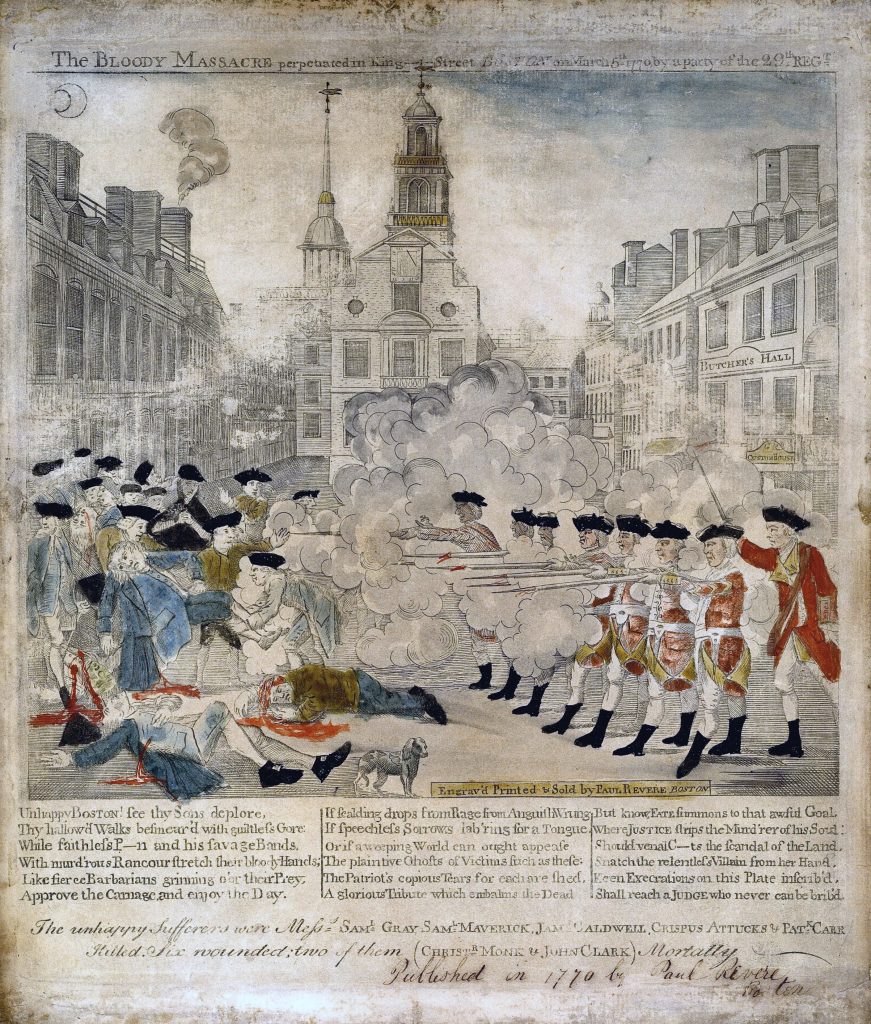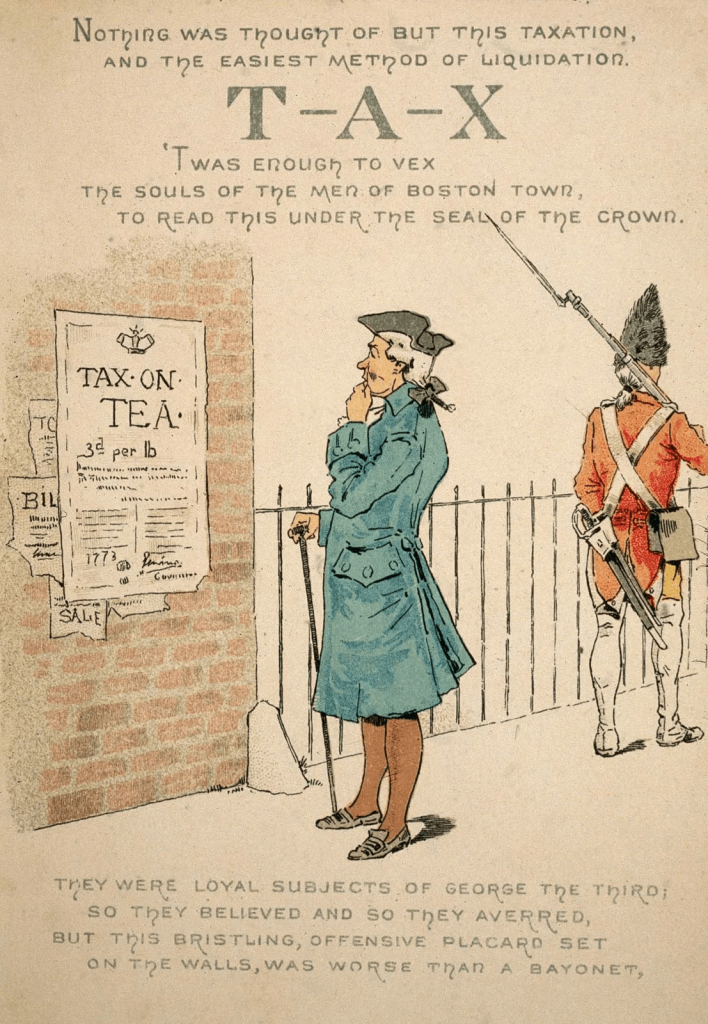Contents
Contents
The Townshend Acts were a series of laws enacted by the British parliament between 1767 and 1768, which imposed a range of new taxes and restrictions on the Thirteen Colonies in America.
In this guide, we’ve explained what the Townshend Acts did, and how colonists reacted to the laws. We’ve also provided some interesting facts you might not know about the Townshend Acts.
Summary and context
In March 1765, the British implemented the Stamp Act in America. It introduced a new tax payable on a wide range of printed media, such as newspapers, certificates, and letters.
The tax was designed to help repay the British war debt the country had built up during the Seven Years’ War. The war lasted from 1756-63, and was mostly fought overseas, which was very costly for the British.
The Stamp Act was the first direct tax implemented by the British parliament on its American colonies, meaning that it was paid by consumers directly.
Although the tax was not large, colonists were outraged. They argued that the British had no right to implement new taxes without the people’s consent.
The colonists had no representation in British parliament, meaning they had no say in how the tax worked, or what the money would be used for. Protestors adopted the slogan “no taxation without representation”, and large-scale boycotts of British goods were organized by groups such as the Sons of Liberty.
A few months later in 1765, the British went a step further, introducing the Quartering Act, which stated that the colonies had to provide shelter and other basic supplies to the British Army stationed in America.
The colonists were again outraged – they saw no need to continue stationing large numbers of British soldiers in America, since the country was not at war. Many colonial governments, most famously New York, refused to abide by the Quartering Act.
To help quell colonial discontent, the British repealed the Stamp Act on 18 March 1766. However, they almost immediately began implementing new taxes and customs restrictions, which became known as the Townshend Acts.
The Townshend Acts
The Townshend Acts were a series of new taxes and restrictions implemented by the British from 1767 to 1768.
They included:
- The Revenue Act of June 29, 1767, introduced new indirect taxes on tea, paint, glass, and other goods, and gave customs officers increased powers to search and seize goods from colonial traders suspected of illegal smuggling.
- The Commissioners of Customs Act of June 29, 1767, created a Customs Board, again giving customs officials more power, in an attempt to prevent smuggling and tax avoidance.
- The Indemnity Act of July 2, 1767, reduced the tax payable on British East India Company tea, making it cheaper to buy compared to tea smuggled into America from other countries such as Holland.
- The New York Restraining Act of July 2, 1767, forbade the colony of New York from implementing any new laws until they began to comply with the Quartering Act.
- The Vice-Admiralty Court Act of March 8, 1768, effectively increased punishments for those accused of smuggling, by creating a new series of courts. Trials would be conducted by a judge, rather than a colonial jury, massively increasing the chances of a successful conviction.
Purpose of the Townshend Acts
- To raise revenue for the British government, to help them repay their war debt.
- To pay the salaries of judges in the colonies. Under the Vice Admiralty Court Act, judges were initially paid from the fines levied against the smugglers they sentenced.
- To punish colonial governments, especially New York, for acts of rebellion, and to assert control over the colonies more broadly.
- To protect British trade interests, by encouraging the colonists to trade more with British firms, especially the British East India Company.
The effects of the acts were threefold:
- The colonists were subject to further taxes that they had no say in, similar to under the Stamp Act. Except this time the taxes were indirect, meaning they only affected merchants, rather than being paid directly by consumers.
- Colonial traders found it more difficult to turn a profit, especially those engaged in smuggling.
- Those accused of smuggling were less likely to receive a fair trial, and generally received harsher punishments when convicted.
Reaction
There was outrage in the colonies in response to the Townshend Acts, in much the same way that people responded to the Stamp Act.
Patriot merchant groups organized boycotts of British goods, and many of the Thirteen Colonies petitioned the King of England to repeal the acts.
George Washington helped organize a non-importation agreement on British goods in Virginia, and merchants in other colonies such as Massachusetts followed suit.
John Dickinson, one of the richest men in the colonies and future Founding Father, published a pamphlet called Letters from a Farmer in Pennsylvania in 1767. He argued that the Townshend Acts were unconstitutional under British law, due to the lack of American representation in parliament, and encouraged colonists to resist the new laws.
Discontent was not as widespread as it was in response to the Stamp Act, in large part because the taxes were relatively small in most cases, and did not affect consumers directly. However, there was significant resistance to the Acts, especially among merchants and Patriot politicians, as the new taxes and rules put in place were considered a huge overreach.
Most resistance against the Townshend Acts was centered in Boston, the biggest port in the colonies, where clashes began occurring between merchants and British customs officers.
On March 5, 1770, five protestors were killed by British soldiers guarding the Boston Custom House, after an angry mob formed. Although not directly linked to protests against the Townshend Acts, anti-British sentiment was high in Boston as a result of the new laws, which contributed to this incident.

Repeal
Most of the Townshend Acts were repealed in April 1770, due to the level of unrest in the colonies, and the trade boycotts of British goods occurring.

However, the reduction in the tax on British tea under the Indemnity Act was kept in place. This decision ultimately led to instances of continued unrest, most notably the Boston Tea Party in 1773.
Facts
- The Townshend Acts were named after Lord Charles Townshend, the British Chancellor of the Exchequer, who proposed the acts. He died in September 1767, before the final act was passed.
- In response to the Acts, the Daughters of Liberty, an organization of colonial women, promoted non-importation by producing homemade fabrics and goods to avoid purchasing British imports.
- More broadly, America saw a huge increase in domestic manufacturing as a result of the Townshend Acts.
- The Revenue Act allowed courts to issue “writs of assistance”, which functioned like a search warrant, giving British customs officers the authority to search any private property for smuggled goods.
- The colonists often avoided the taxes outlined in the Townshend Acts. This, along with the cost of enforcing the new customs rules, was part of the reason why the acts were mostly repealed in 1770.


